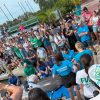Assistant Professor of Mathematics Bjoern Muetzel, Ph.D., has always been fascinated by the art found in nature—beautiful repeating patterns organically formed. He began sharing his enchantment with local grade schoolers a few years ago through the use of geometric tiles.
“Here in St. Petersburg, we experienced the difference and inequality among different schools firsthand in the schools of our children,” Muetzel explains. “That is why I started working with the Shirley Proctor Puller Foundation, whose goal is to advance reading, math and science literacy, helping to close the achievement gap for children in St. Petersburg.”
Now Muetzel will have the resources and institutional support to expand his work at the Foundation. He was one of six professors selected by the Eckerd College St. Pete Center for Civic Engagement and Social Impact as the 2023–2024 Faculty Fellows. The new cohort will launch or expand four projects that will create meaningful partnerships and offer students curricular, research-based and/or reflective service opportunities that bridge campus and community.
Muetzel’s project, Finding the Right Angle: Community Math Project for Underserved Students, will offer geometry activities and math tutoring/homework help year-round at the Shirley Proctor Puller Foundation using Eckerd College student volunteers and geometry manipulatives. Eventually, he will develop a Reflective Service Learning component to his calculus classes, so his students may earn community service hours toward graduation for volunteering at the Foundation.
The 2023–2024 ECSPC Faculty Fellows also include:
- Assistant Professor of Chemistry Jalisa Ferguson, Ph.D., and Visiting Assistant Professor of Classics Michael Goyette, Ph.D., who will build a long-term community-based service project or internship to accompany their new team-taught course, Science Ethics for the Common Good, directed at underclass STEM students to broaden their education to consider the real-world implications of invention and inquiry;
- Professor of Biology and Marine Science Shannon Gowans, Ph.D., and Associate Professor of Marine Science Amy Siuda, Ph.D., who plan to revive and expand the Used Once, Lasts Forever Art Show, a community art event where creatives turn trash into discussable art pieces that highlight the importance of reducing single-use plastics—as the duo stages the show, they’ll also be formulating a zero waste event guide that any entity might utilize to make sure their events have low impacts on the environment; and
- Assistant Professor of Psychology Jessica Leffers, Ph.D., who plans to engage K–12 students from local programs in an interventional study that will help them realize that stereotypes about race, gender and class are not genetically determined. With the help of Eckerd student researchers, Leffers plans to use the Faculty Fellowship to fund the study design and approval process, data collection and analysis, and development of a replicable educational program for future use.
Goyette says teaching the Science Ethics for the Common Good course with Ferguson seemed like a fantastic new opportunity to put his goals into practice in ways that could be highly meaningful and impactful for Eckerd students and local communities.
“As a humanist whose teaching and research often focus on the history of medicine and the history of science, I am always eager to find opportunities to demonstrate how the study of humanities and the sciences can complement and speak to each other,” Goyette explains. “Similarly, as a professor of classics and ancient studies, I am constantly looking for ways to use the perspectives of the past to illuminate present-day issues and imagine better ways forward.”
Gowans and Siuda are excited about partnering with the St. Pete Center to share the zero waste guide both on campus and throughout the community.
“As marine scientists, we have long been aware of the problems caused by marine plastic pollution. However, the solution to this problem requires humans to change their behavior on land to reduce their plastic consumption,” Gowans explains. “We established the Reduce Single-Use project at Eckerd in 2018, and the St. Pete Center Fellowship is a natural fit for our project.”
Leffers, who joined the Eckerd faculty in 2021, says she was surprised to learn of how few of the College’s students are from St. Petersburg, and looks at her project as an opportunity to recruit as well as inform.
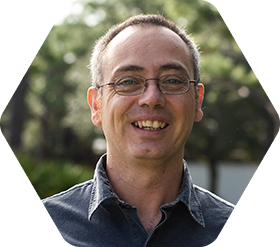

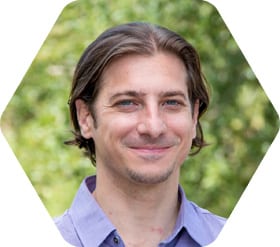
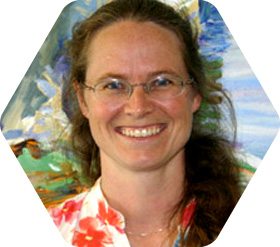
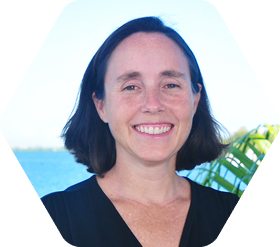
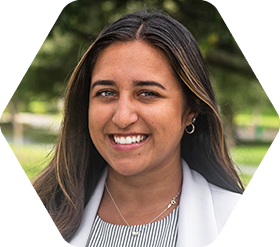
Top to bottom: Assistant Professor of Mathematics Bjoern Muetzel, Assistant Professor of Chemistry Jalisa Ferguson, Visiting Assistant Professor of Classics Michael Goyette, Professor of Biology and Marine Science Shannon Gowans, Associate Professor of Marine Science Amy Siuda, Assistant Professor of Psychology Jessica Leffers
“I think this project will be a great way for our students to get out into the community and build some connections but also for the members of the community to get to know us as an institution,” Leffers says.
“I hope that the research and educational intervention can change the way people think about social categories and approach things—with a more open, growth mindset.”
The ECSPC Faculty Fellows’ appointment will be for one-and-a-half academic years and may be renewable for up to three years. Fellows will be required to reapply annually to remain in the program. “The St. Pete Center fosters a variety of great projects that connect campus and community to make a meaningful and lasting change,” Muetzel says. “This is a great opportunity for faculty members to step out of the ‘ivory tower’ and to creatively apply their expertise not only academically but practically—to make, at least, a small difference in the real world.”












